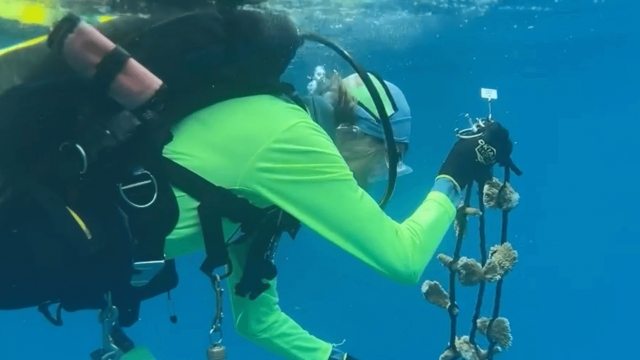Ken Nedimyer and his crew are headed to sea for an urgent rescue.
Just offshore near Key Largo Florida, a small armada of boats gathers for an unprecedented mission: saving corals in critical danger.
Below the ocean surface is what has coral experts worried: widespread, bone-white patches of bleached coral. Scientists say unusually-warm ocean water is stressing the tiny animals to their breaking point.
"We've seen temperatures hit 93, 94 degrees on the bottom, which in terms of recorded data history, is unheard of," says Katey Lesneski, a coral scientist with the Mission Iconic Reefs program at the Florida Keys National Marine Sanctuary.
"If a coral bleaches, it doesn't mean it's dead, but if conditions don't improve and it can't recover within a couple weeks to a month, it will die," Lesneski says.
The main driver of warmer oceans, say climate scientists, is humans burning fossil fuels, steadily cranking up the planet's thermostat. Peer-reviewed scientific studies reveal about 90-percent of that excess heat is absorbed by the oceans.
Nedimyer is considered the godfather of coral reef restoration. He's been diving the Florida Keys since 1969.
"When I first started coming down here it was a magical paradise," he says.
Over the decades he's watched the health of the coral reefs decline, and 2023, he says, is the worst he's ever seen.
"They go from a brown color to a clear color the tissue is clear and when that happens, they're basically starting to starve to death," Nedimyer says.
Now, in a mission led by the National Oceanic and Atmospheric Administration, Nedimyer and a coalition of conservation groups, government agencies and volunteers are doing something that once seemed unthinkable.
"So we kind of came up with this idea that-- what if we took them to deeper water?" Nedimyer says. "Deeper water tends to be a little bit cooler," he says.
Teams of divers are mobilizing to quickly gather corals from shallow underwater and transplant them into deeper, cooler water.
The corals are loaded onboard boats, and the team has less than an hour to race them to their new home.
SEE MORE: What does prolonged ocean heat mean for our weather?
The water temperatures are just a few degrees cooler, but Nedimyer says it's just enough to give the corals a fighting chance.
" We're trying a lot of different things because there's so much at risk here. And every day I'm out here and I'm getting more and more nervous about leaving anything here but I don't have any other options," he says.
Coral reefs are often called the rainforests of the sea, supporting a quarter of all sea creatures, creating barriers that protect against storm surge, and contributing nearly $10 trillion a year to the global economy.
In the Florida Keys alone-- which bills itself as a diving and fishing paradise-- reefs are worth $8.5 billion a year and support roughly 70,400 jobs, according to NOAA.
But climate scientists report if global air temperatures rise just 3.4 degrees Fahrenheit, virtually all corals (99%) would be wiped out. It could happen by 2050, according to a 2018 report by climate scientists at the Intergovernmental Panel on Climate Change.
Nedimyer says he tries to be optimistic.
"I still think there's hope. There's still pockets where it's beautiful and fantastic," he says.
He says one potential key to survival is finding and growing corals that are more resilient to the heat.
"We have some down there that are just as happy as can be. It's like, 'bring it on, I love hot water'", he says.
The plan is to eventually return the transplanted corals to where they belong, but scientists say it may be September before the water cools down enough. Nedimyer says the future for corals-- especially in a warming world-- is still murky.
"I hope my grandkids can see it. I want them to experience it," he says. "And I hate thought that my generation screwed it up for the next generation."
SEE MORE: Rising ocean temps contributing to Florida's dying coral reefs
Trending stories at Scrippsnews.com



